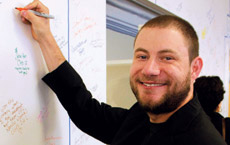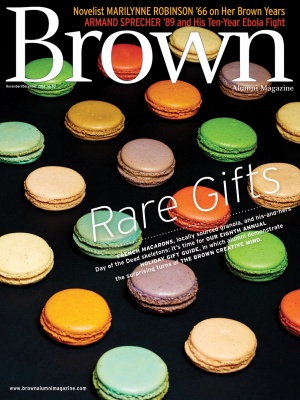Commencement 2009 was still two months away when Mollie West ’09 and
Andy Posner ’09 AM issued the first loan from the Capital Good Fund
(CGF), a microcredit lender they cofounded. The pair sat in the
Providence Public Library to sign the paperwork with a woman from the
Dominican Republic who was borrowing $875 to cover the fees for her
citizenship application. Those first few months were “pretty
nerve-wracking,” says Posner. “We were cutting checks to someone hoping
they’d pay us back.”

Soon West and Posner were lending up to $3,000 at a time to allow
applicants to start small businesses or boost bad credit scores. Such
microfinance is well-established in the developing world, but the
practice has only just begun to take root in the United States. West
says that Rhode Island bankers were less than encouraging in the
beginning. “They all told us this was a bad idea,” she says. “They all
thought that the poor would not pay back their loans.” So she and
Posner turned to other sources of financing, eventually raising $20,000
from foundations, family, and friends. Posner assumed the position of
director of the Fund. (West is now a CGF board member.)
Prospective borrowers also didn’t know what to do with West and Posner
at first. At an early presentation in the Olneyville section of
Providence they were mistaken for loan sharks or some other form of
predatory lender. Given the exorbitant interest rates demanded by loan
sharks—well over the state legal limit of 21 percent—the people of
Olneyville didn’t believe the CGF would charge them only 15 percent.
“They thought it was a total scam,” West recalls.

Posner and West, who is now a master’s candidate in business design at the Parsons School of Design, were introduced to each other at Brown by Alan Harlam, director of innovation and social entrepreneurship at the Swearer Center for Public Service. Each had expressed the wish to start a microfinance bank for people unable to get a line of credit from traditional banks.
“Meeting Mollie was pretty transformational,” Posner says. “I realized I had an ally. Without her, I don’t know that I would have ever completed all the research.” The duo was inspired by microfinance pioneer Muhammad Yunus, who won a Nobel Peace Prize for founding Bangladesh’s Grameen Bank, which pioneered microloans to the poor in the 1970s.
Five years and more than 550 loans later, West and Posner point to their 93 percent repayment rate as proof that the system works. Former president Bill Clinton has lauded their work, and the Clinton Foundation has donated to CGF.
“What immigrants want is the old-fashioned American dream,” West says. “ If we can help them do that for $800, that’s pretty incredible.”




